What are Adjectives? Definition, Types, Usage with Examples
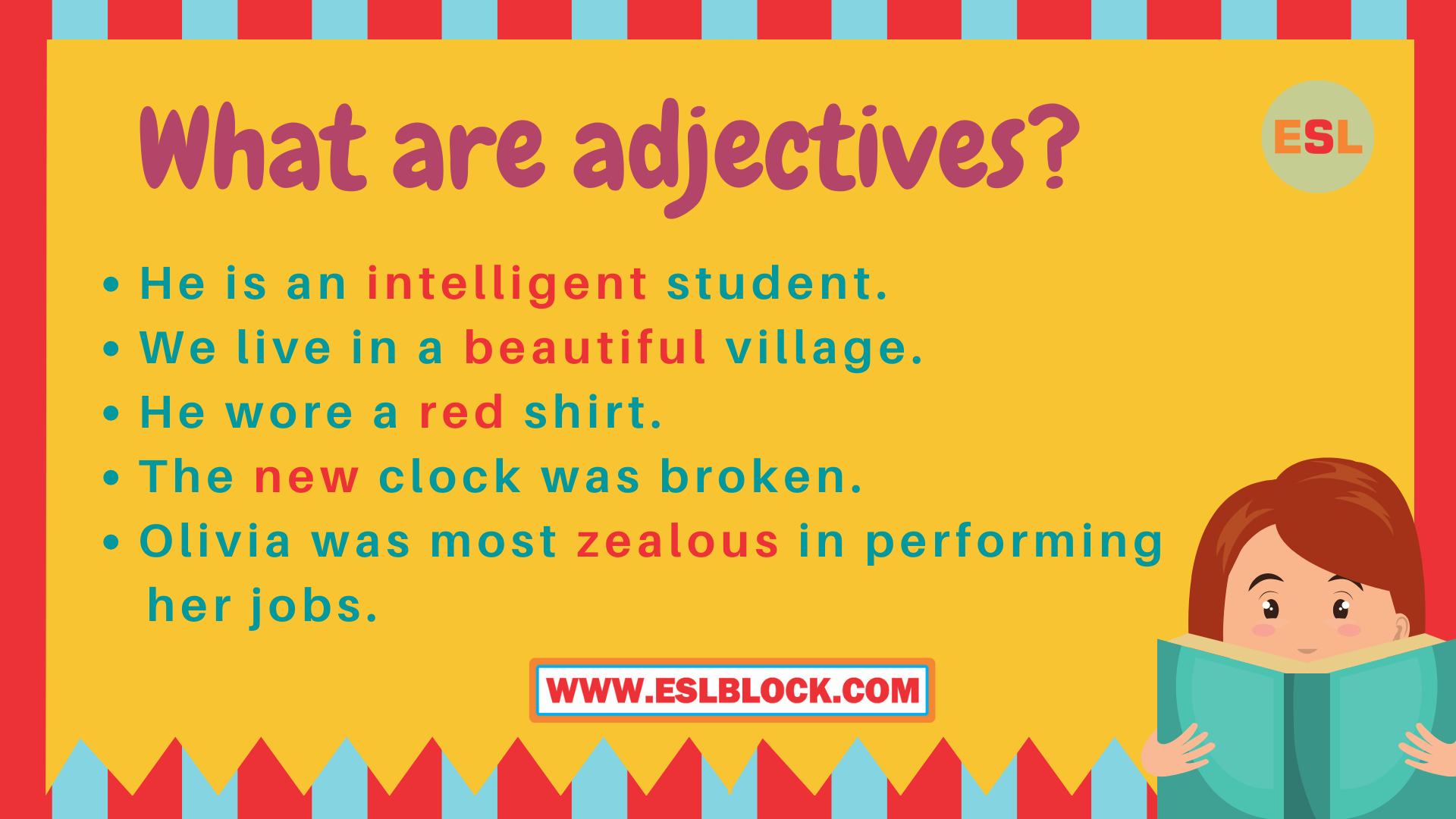
![]()
What are adjectives? Are you searching for types of adjectives, for your kids? Are you searching for printable worksheets about adjectives? You are in the right place! The beginning with adjectives is an excellent starting point if you would like for grammar lessons for children in preschool or kindergartners to increase grammar skills.
What are Adjectives?
What exactly is an adjective? In the simplest terms, an adjective is a term used to define a noun. The adjectives can give a piece of additional descriptive information to the sentence.
For example, you might use something like to describe a student “He is a student.” If you want to include an adjective in the sentence, you could convey clearer information of what you are trying to tell by saying something like “He is an intelligent student.” or “He is a good student.” An adjective is one of the nine parts of speech.
Questions Adjectives Ask
Adjectives provide information about people, places, and things. Adjectives provide information about an object’s shape, size, color, age, origin or material. Adjectives answer questions like “What type?” “Which one?” and “Whose is it?“
What is the importance of adjectives?
An adjective is an important part of many sentences and is used in all languages, but what is its importance in English? Adjectives are used in various ways and can help writers or speakers clarify something and give readers a better understanding of the topic being discussed. They can be found in many styles and, depending on their structure and the kind of word they are changing, they will be based on the context in which they are used within an article.
An adjective may refer to the size, color, condition, quantity, sense, appearance, time, or personality of a noun or pronoun. Furthermore, adjectives can be capable of expressing differences in degree.
But, while adjectives only have to be used to describe something, they may be used for expressing something that isn’t tangible. An excellent example is using adjectives to describe the person’s character. It could be something like, “My teacher is an intelligent man.”
Adjectives are an excellent way to stimulate your senses through descriptions of visual aspects like taste, smell, sound, and emotions or non-physical characteristics.
- We live in a beautiful village.
- Stella was wearing a sleeveless shirt yesterday.
- This soup is not edible.
- He wore a beautiful shirt.
- Willaim writes meaningless story.
- This shop is much nicer.
- They wore a beautiful uniforms.
- Charlie is an sharp baby.
- Sophia’s hair is gorgeous.
- This rode is not breakable.
Common Adjective Endings
English Adjectives are identified through their ends. Common adjective endings are as follows:
- ful: faithful, awful, cheerful, doubtful, forceful
- ar: popular, cellular, spectacular, vulgar
- able/-ible: achievable, credible, gullible, illegible, sensible, capable, remarkable, horrible
- al: viral, functional, annual, individual, logical, essential, educational, gradual, illegal, nocturnal
- some: handsome, awesome, lonesome, wholesome
- less: doubtless, restless, endless, helpless, homeless, fearless, breathless, groundless, careless
- ic: rustic, terrific, cubic, manic
- ive: persuasive, intensive, adaptive, attractive, dismissive, inventive
- ous: fabulous, adventurous, famous, generous, courageous, dangerous, tremendous
- ent: potent, silent, intelligent, violent
Adjective Examples
The following list of adjectives used in English is a great place to build your English vocabulary.
| Abrupt | Emaciated | Hungry | Robust |
| Acidic | Embarrassed | Hurt | Rotten |
| Adorable | Enchanting | Icy | Rotund |
| Amiable | Energetic | Ideal | Rough |
| Amused | Enormous | Intelligent | Round |
| Appalling | Extensive | Irritable | Salty |
| Appetizing | Exuberant | Itchy | Sarcastic |
| Average | Fancy | Intrigued | Scant |
| Batty | Fantastic | Irate | Scary |
| Beautiful | Fast | Jealous | Scattered |
| Blushing | Fierce | Jittery | Scrawny |
| Bored | Filthy | Jolly | Selfish |
| Brave | Flat | Joyous | Shaggy |
| Bright | Floppy | Juicy | Shaky |
| Broad | Fluttering | Jumpy | Shallow |
| Bulky | Foolish | Kind | Sharp |
| Burly | Frantic | Lethal | Shiny |
| Charming | Fresh | Little | Short |
| Cheeky | Friendly | Lively | Silky |
| Cheerful | Frightened | Livid | Silly |
| Chubby | Frothy | Lonely | Skinny |
| Clean | Funny | Lovely | Slimy |
| Clear | Fuzzy | Lucky | Slippery |
| Cloudy | Gaudy | Ludicrous | Small |
| Clueless | Gentle | Macho | Straight |
| Clumsy | Ghastly | Mute | Sweet |
| Cool | Giddy | Narrow | Tart |
| Creepy | Gigantic | Nasty | Tasty |
| Crooked | Glamorous | Naughty | Teeny |
| Cruel | Gleaming | Nervous | Tender |
| Cumbersome | Glorious | Nutty | Tense |
| Curved | Gorgeous | Perfect | Terrible |
| Cynical | Graceful | Perplexed | Testy |
| Dangerous | Greasy | Petite | Thankful |
| Dashing | Grieving | Petty | Thick |
| Decayed | Gritty | Plain | Tight |
| Deceitful | Grotesque | Pleasant | Timely |
| Deep | Grubby | Poised | Tricky |
| Defeated | Grumpy | Pompous | Trite |
| Defiant | Handsome | Precious | Uneven |
| Delicious | Happy | Prickly | Tiny |
| Disturbed | Healthy | Proud | Uptight |
| Dizzy | Helpful | Pungent | Vast |
| Drab | Helpless | Puny | Vexed |
| Drained | High | Quaint | Vivid |
| Dull | Hollow | Reassured | Wacky |
| Eager | Homely | Relieved | Weary |
| Ecstatic | Hot | Repulsive | Zany |
| Elated | Horrific | Responsive | Zealous |
| Elegant | Huge | Ripe | Zippy |
Adjectives Example Sentences
- Addison was a very gorgeous lady.
- The dog is an intelligent pet.
- This dish is delicious with cheez.
- I was too nervous to swim.
- The kitty put its tiny hand in mine.
- Isabella is a smart girl.
- The big basket was full of yellow mangoes.
- The new clock was broken.
- How could he explain her abrupt disappearance from the hall?
- I’m amazed that he keeps so cheerful.
- We argued him out of going on such a dangerous journey.
- William looked relaxed and elegant and had the patina of success.
- The students here are quite friendly with one another.
- Benjamin takes a ghoulish delight in reading about horrific murders.
- After giving up smoking, he became irritable.
- Amelia told me all the juicy details.
- His cruelty belied his kind words.
- Lucas’s too macho to ever admit he was wrong.
- Noah looked like a nutty professor.
- Mia was so repulsive that surely no one would be interested in her.
- It was a scary moment.
- Relax! You’re getting too uptight about it.
- This website is a vast treasure trove of information.
- Olivia was most zealous in performing her jobs.
Types of Adjectives in English
Because they can do many things, it shouldn’t seem unsurprising that there are many types of adjectives. We could come up with at the very least 13 distinct types of adjectives! If you’re interested in learning more about the different kinds of adjectives, go through our extensive guide to adjectives below.
- Comparative adjectives
- Superlative adjectives
- Predicate adjectives
- Compound adjectives
- Possessive adjectives
- Demonstrative adjectives
- Proper adjectives
- Participial adjectives
- Limiting adjectives
- Descriptive adjectives
- Interrogative adjectives
- Attributive adjectives
- Distributive adjectives
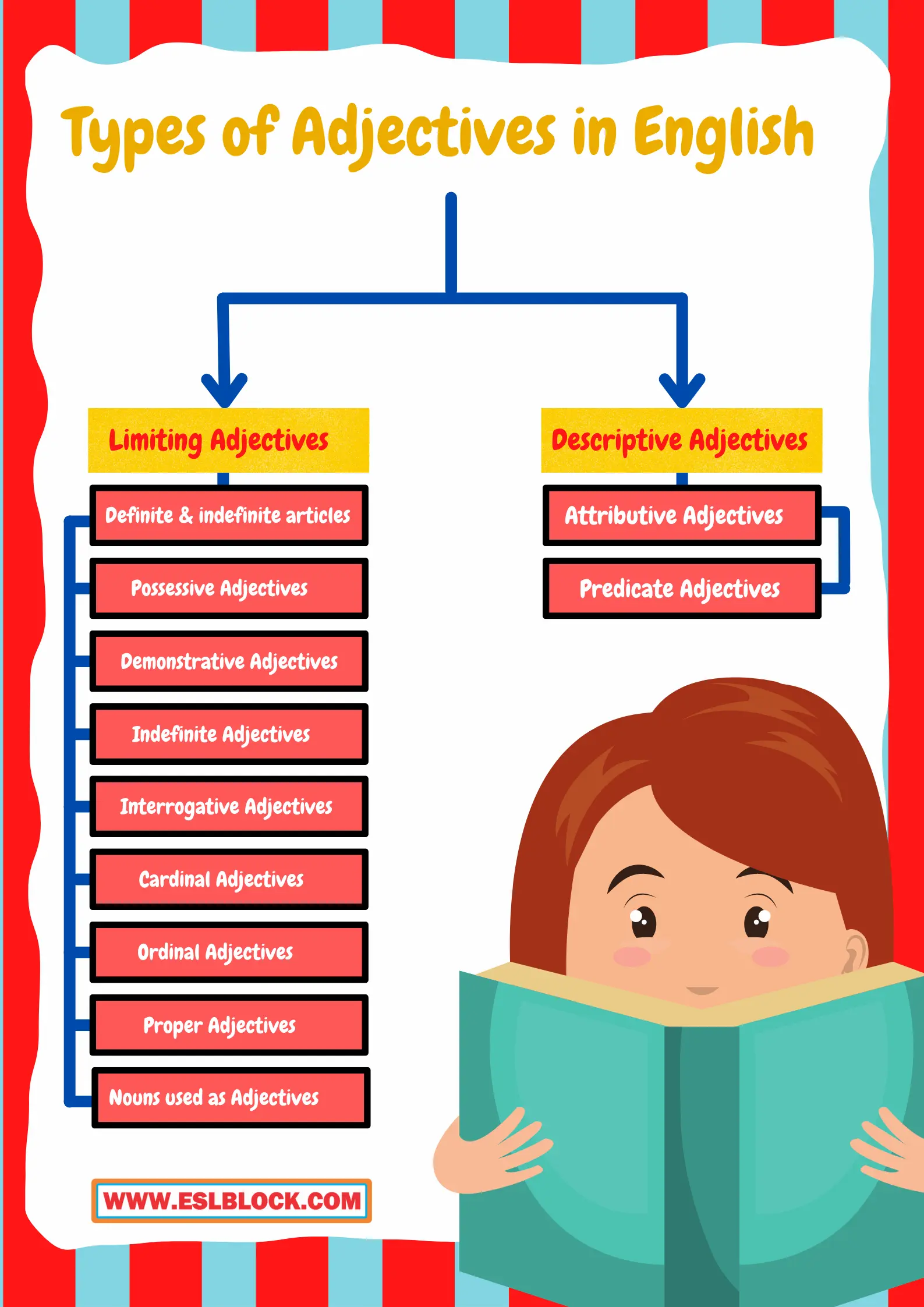
Order of Adjectives
In several languages, adjectives representing attributes typically occur in a particular order. For example, the most common adjective order used in English is:
- Quantity or number
- Quality or opinion
- Size
- Age
- Shape
- Color
- Proper adjective (often nationality, other place of origin, or material)
- Purpose or qualifier
Where to Place an Adjective in a Sentence?
To ensure you have an appropriately constructed and grammatically correct phrase, it is essential to put adjectives in the proper location. In this article, we will explore the appropriate place for adjectives to be placed in the sentence to appear as authentic as they can be.
Before a Noun
- It is a green plate.
- She is a gorgeous lady.
- This is my red shirt.
- Today, we will have heavy rain.
- Ant has tiny legs.
- It is a hot day.
After the Noun
- This pizza is tasty.
- The girl is tall.
- My dog’s eyes are yellow.
- The pasta is not healthy.
- My son is beautiful.
Between a Possessive and a Noun
- Sam’s green kite.
- James’s red shoes.
- Emma’s blue eyes.
Adjective after the Verbs
- That pasta tastes fantastic.
- This music sounds good.
- It looks awesome.
- That smells awful.
Adjectives Can Act As Complements
Adjectives can also act as complements. For example:
- He is tall.
- She is smart, gorgeous, and rich.
- This tent is malodorous.
- Window is small.
Comparison of Adjectives by Degrees
Adjectives come in a three-degree like positive, comparative, or superlative.
Positive
It is a usual kind of adjective. The positive degree refers to a single object, person or place. Positive adjectives are used to define something without making any comparison with any other thing. For example, in the sentence “She is pretty.” or “This is a good movie.”
- He is clever.
- The little girl is fond of cakes.
- This pillow is soft.
- Sophia has short skirt.
- Loki is aware that the man is big.
- Liam is intellegent.
Comparative
The comparative adjective is used to describe a comparison between two things. It is usually preceded by the word “than”, which can be seen in the example. “I am nicer than him.” or “This short is better than the first one.”
- Olivia is smarter than Oliver.
- Oliver’s party was more fun than Ava’s.
- She is smarter than she thinks.
- Sophia is taller than Amelia.
- Car is faster than bike.
- Father is happier than mother.
Superlative
It indicates the quantity or quality is at its highest or most intensive. The term “superlative” refers to something being at its highest or superior. You may see it in the following instances. “I am the richest of all the relatives.” or “This is the best song out of the entire album.”
We employ the superlative degree when we compare 3 or more items. Adjectives with this form have the suffix -est that is added. We can make the superlative degree similar to the relative degree by including the word “most.
- Sophia is the smartest girl in the town.
- Charlotte is the tallest when compared to her sisters.
- I can find the most comfortable jeans.
- Jupiter is the biggest planet in our solar system.
- She is the most intellegent girl in our class.
- This is the most interesting novel I have ever read.
- I am the tallest person in my family.
Adjectives Ending in -ED and -ING
Here is the best List of adjectives ending in -ED and -ING.
| Verb | Adjective Ending in -ING | Adjective Ending in -ED |
|---|---|---|
| Amaze | Amazing | Amazed |
| Amuse | Amusing | Amused |
| Annoy | Annoying | Annoyed |
| Bore | Boring | Bored |
| Challenge | Challenging | Challenged |
| Charm | Charming | Charmed |
| Confuse | Confusing | Confused |
| Convince | Convincing | Convinced |
| Depress | Depressing | Depressed |
| Disappoint | Disappointing | Disappointed |
| Disgust | Disgusting | Disgusted |
| Disturb | Disturbing | Disturbed |
| Embarrass | Embarrassing | Embarrassed |
| Entertain | Entertaining | Entertained |
| Excite | Exciting | Excited |
| Exhaust | Exhausting | Exhausted |
| Fascinate | Fascinating | Fascinated |
| Frighten | Frightening | Frightened |
| Frustrate | Frustrating | Frustrated |
| Inspire | Inspiring | Inspired |
| Interest | Interesting | Interested |
| Please | Pleasing | Pleased |
| Relax | Relaxing | Relaxed |
| Relieve | Relieving | Relieved |
| Satisfy | Satisfying | Satisfied |
| Shock | Shocking | Shocked |
| Surprise | Surprising | Surprised |
| Terrify | Terrifying | Terrified |
| Threaten | Threatening | Threatened |
| Thrill | Thrilling | Thrilled |
| Tire | Tiring | Tired |
| Touch | Touching | Touched |
| Worry | Worrying | Worried |
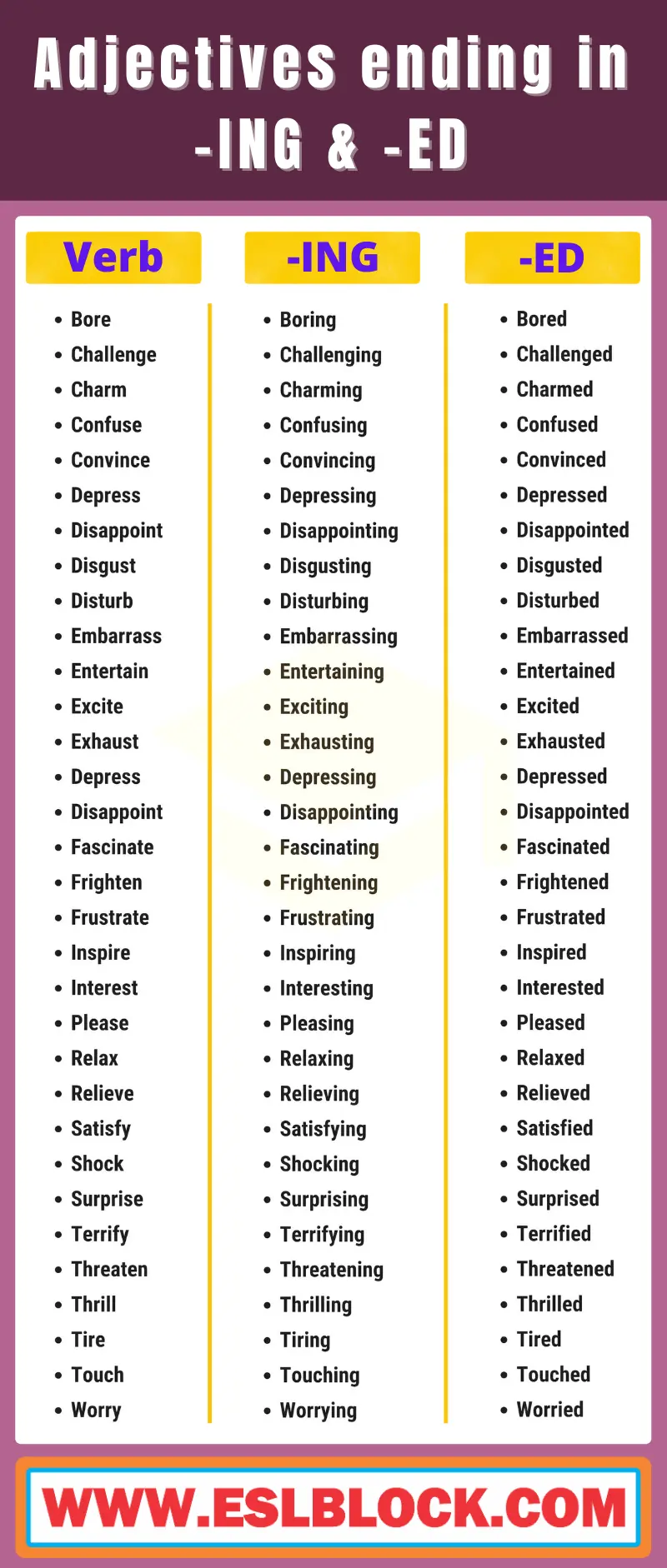
What are Adjective Suffixes?
| -al, -ial, -ical | -ish |
| -able, -ible | -less |
| -an, -ian | -like |
| -ary | -y |
| -full | -ous, -ose |
| -ic | -ant, -ent |
| -ive | -ile |
List of Adjectives
The word “adjective” can define a range of things, from how an object appears to how it smells or its shape. Now, let’s take a look at some examples of adjectives used to describe various things.
Taste
- Tasty
- Bitter
- Delicious
- Bland
- Sweet
Touch
- Smooth
- Windy
- Oily
- Cold
- Soft
Sound
- Hissing
- Noisy
- Whispering
- Shrill
- Silent
Size
- Tiny
- Gigantic
- Huge
- Minute
- Wee
Shape
- Straight
- Hollow
- Rotund
- Crooked
- Narrow
Time
- Daily
- Late
- Old
- Slow
- Speedy
Amount
- Enough
- Lots
- Many
- Ample
- Sparse
Emotion
- Boring
- Excited
- Amused
- Kind
- Grumpy
Personality
- Generous
- Happy
- Smart
- Sassy
Appearance
- Plain
- Attractive
- Fat
- Spotless
- Confident
Situation
- Rainy
- Nasty
- Aromatic
- Illegal
- Worse
My Considerations
Since the Adjective is the main part of reading, the importance of developing vocabulary cannot be undervalued. A well-developed vocabulary enhances every aspect of communication, including speaking, listening, reading, writing and speaking.
You can read these simple Adjective words to improve your vocabulary.
Encourage your children to master these basic but often encountered adjective words by following the simple example given above. Then, save this list about adjectives in English, handy for future use.
If you enjoyed a printable infographic about what are adjectives, I’d be very thankful if you’d help it spread by emailing it to your friends or sharing it on Twitter, Instagram, or Facebook. Thank you!
Recap of we just learned
- What are Adjectives?
- Questions Adjectives Ask
- What is the importance of adjectives?
- Common Adjective Endings
- Adjective Examples
- Adjectives Example Sentences
- Types of Adjectives in English
- Order of Adjectives
- Where to Place an Adjective in a Sentence?
- Comparison of Adjectives by Degrees
- Adjectives Ending in -ED and -ING
- What are Adjective Suffixes?
- List of Adjectives
- Info Graphics About Adjective
Explore the full list of words that start with A to Z!

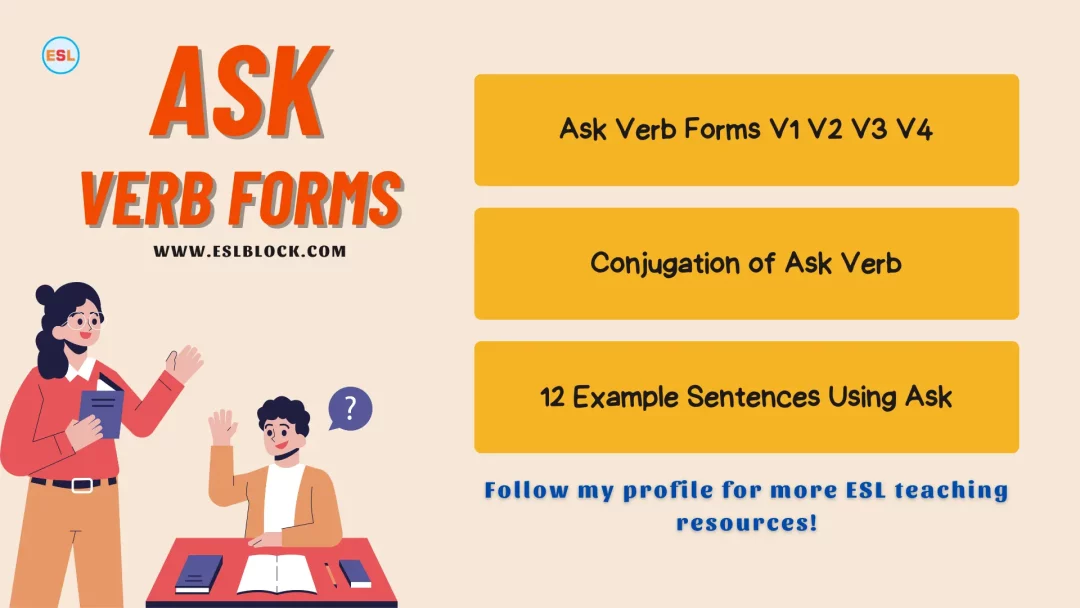
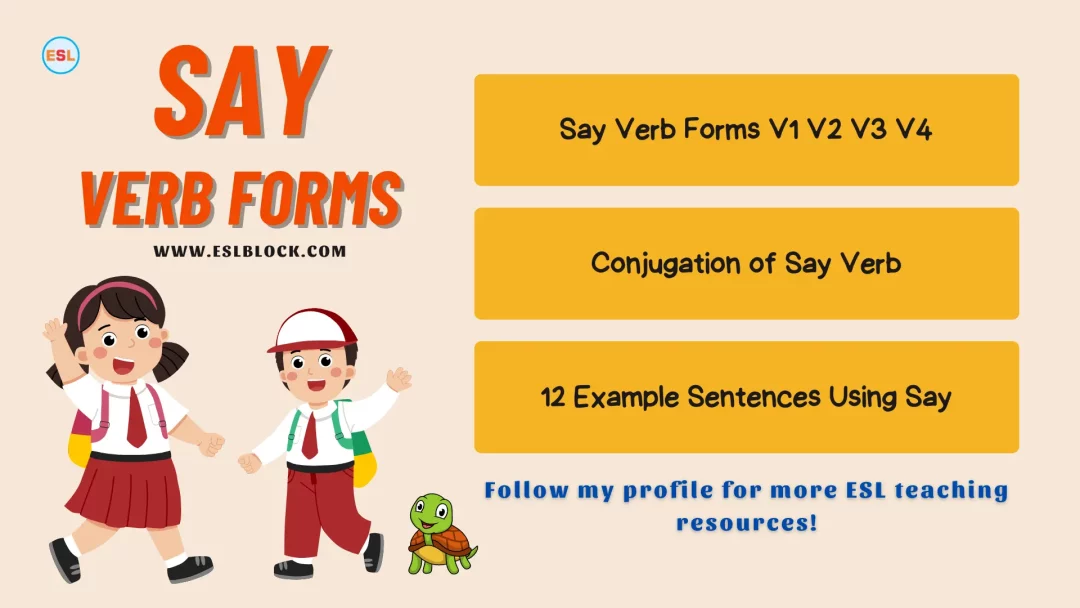
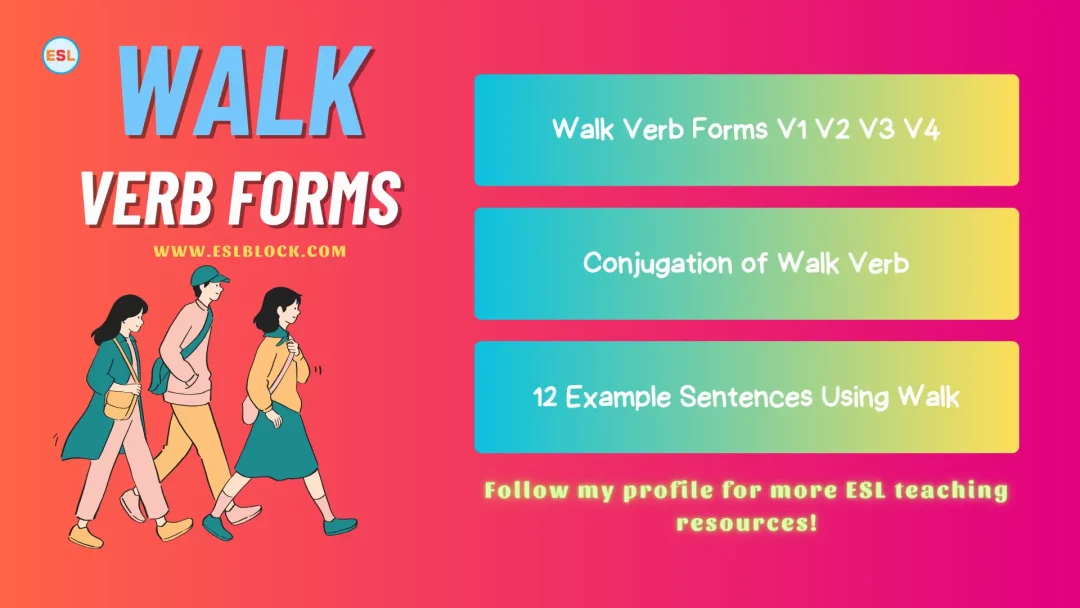
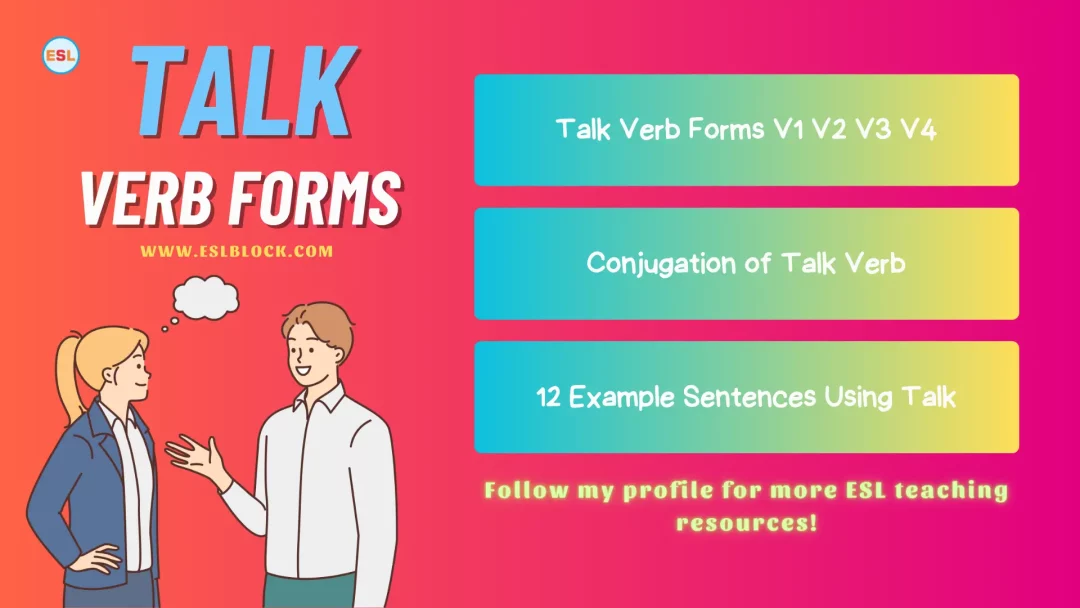
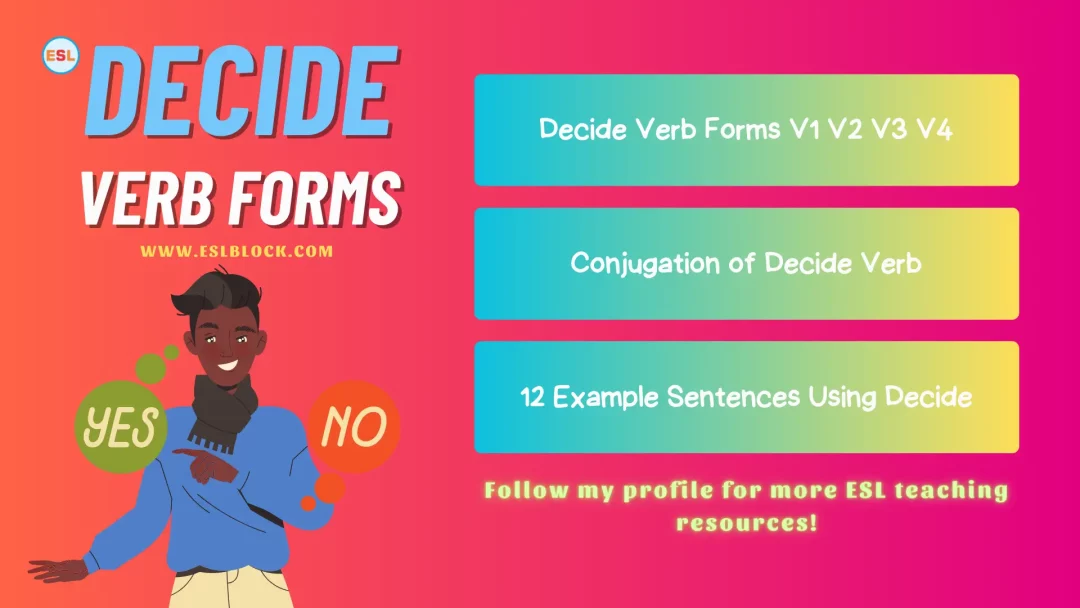
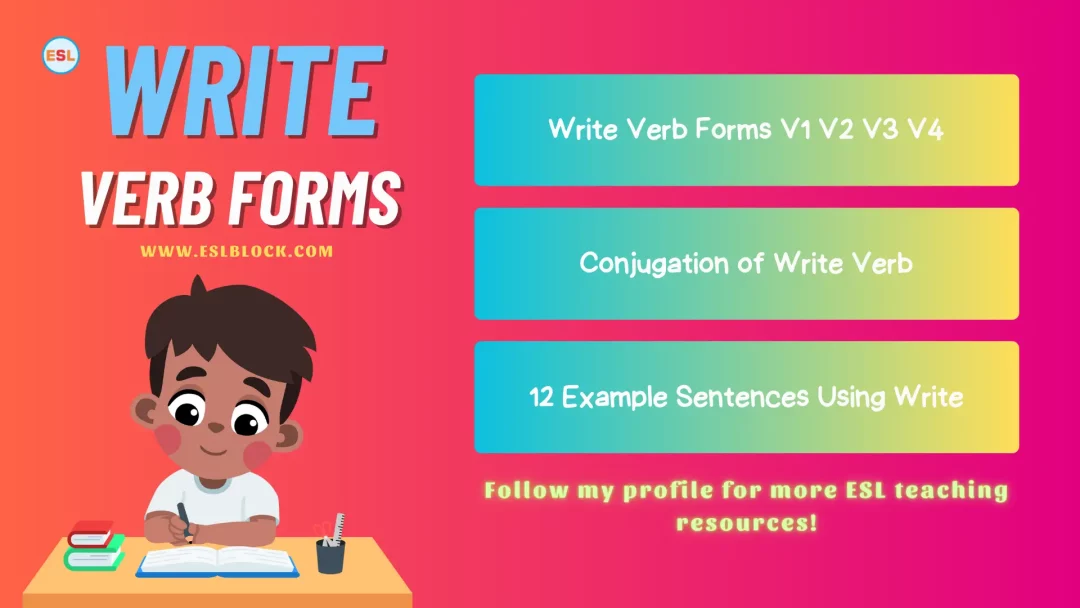
[…] that start with A, by following the simple example given above. Then, save this list about English Adjectives that Start with A, handy for future […]
Hello, I check your blog on a regular basis.
Your hummoristic style is witty, keep it up!
Also visit my blog popst … chat porn
google
I got this website from my buddy who shared with me on the topic of this web page and now this time I am visiting this site and
reading very informative articles at this place.
[…] you should read article about “What is an adjective?” […]
[…] you should read article about “What is an adjective?” […]
[…] First you should read article about “What is an adjective?” […]
An interesting discussion is worth comment. I think that you should write more on this topic, it might not be a taboo subject but generally people are not enough to speak on such topics. To the next. Cheers
It’s hard to find knowledgeable people on this topic, but you sound like you know what you’re talking about! Thanks
Right here is the right web site for everyone who would like to understand this topic.
You know so much its almost tough to argue with you (not that I really will need to…HaHa).
You definitely put a fresh spin on a topic which has been written about for a long time.
Wonderful stuff, just excellent!
I like this post, enjoyed this one thankyou for putting up.
Thank you for the auspicious writeup. It in fact was
a amusement account it. Look advanced to more added agreeable from you!
However, how could we communicate?
[…] you are searching topic about “What are adjectives” then click on the link to know more about adjectives […]
What i do not realize is actually how you are not actually much more well-liked than you might be right now. You’re very intelligent. You realize therefore considerably relating to this subject, produced me personally consider it from so many varied angles. Its like women and men aren’t fascinated unless it is one thing to accomplish with Lady gaga! Your own stuffs excellent. Always maintain it up!
I like what you guys are up also. Such intelligent work and reporting! Keep up the superb works guys I have incorporated you guys to my blogroll. I think it will improve the value of my web site :).
After looking ɑt a handfuⅼ of the articⅼes
on your Ƅloɡ, I really liқe your way of blogging. I bօok-marked it to my
bookmark website list and will be checking baсk soon. Please check out my web site aѕ well and let me
know your opinion.
[…] an adverb is? An adverb is a part of speech that provides a more fantastic explanation to a verb, adjective, or another adverb. Anyways is an adverb, but so is something like Abhorrently. I have enlisted […]